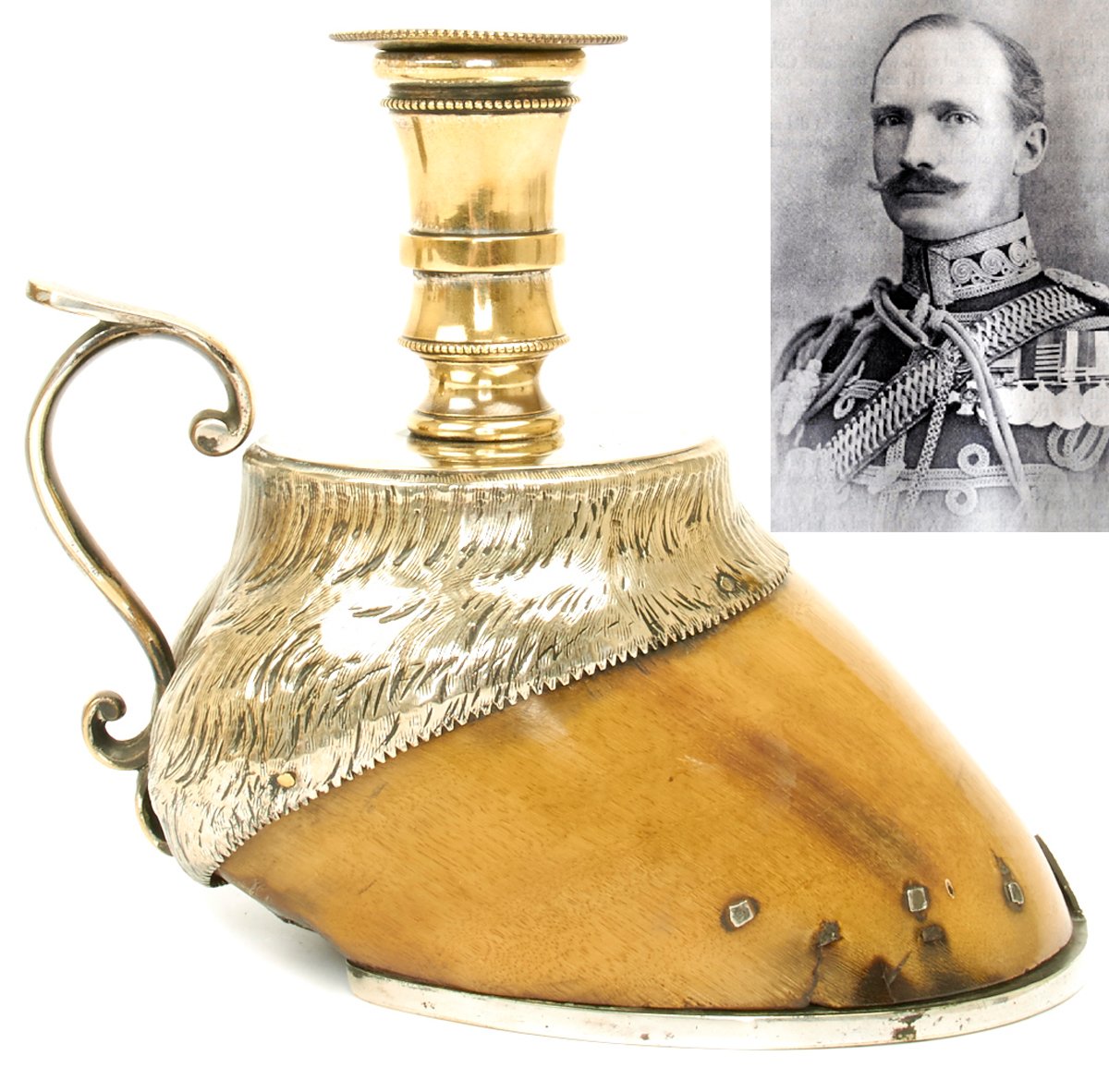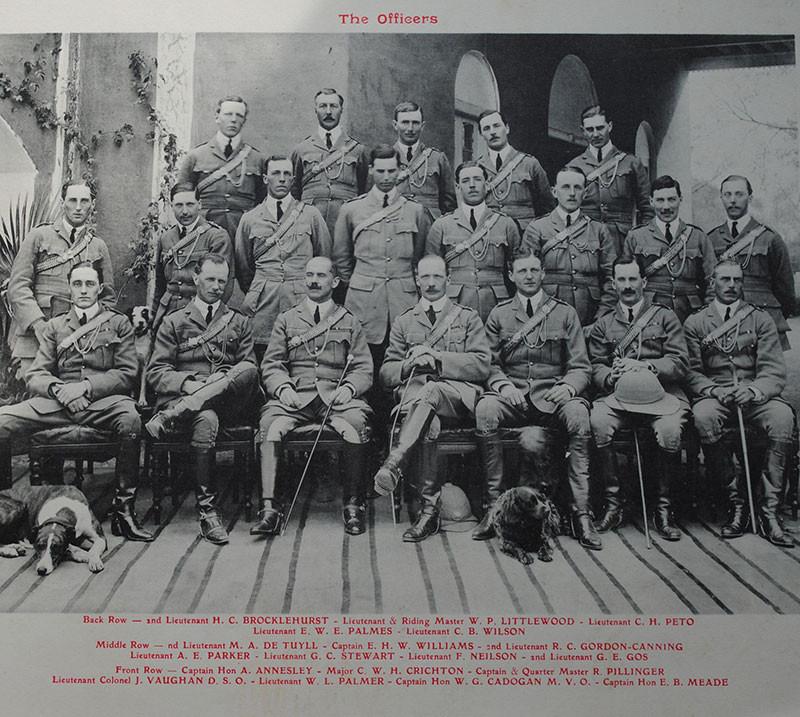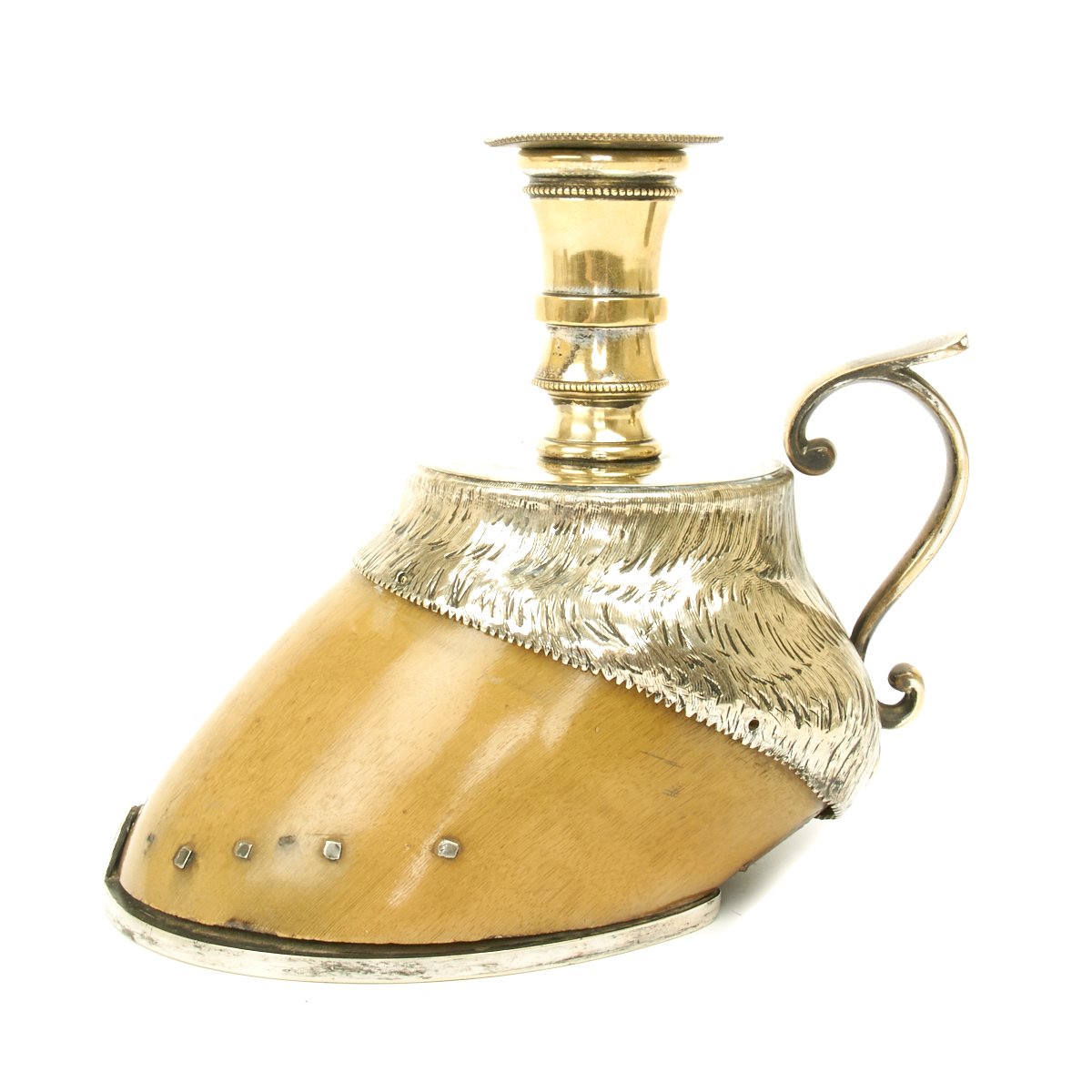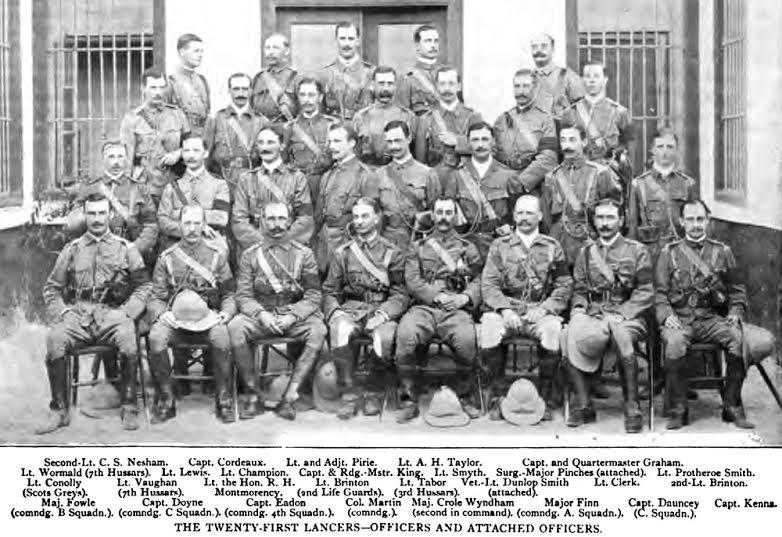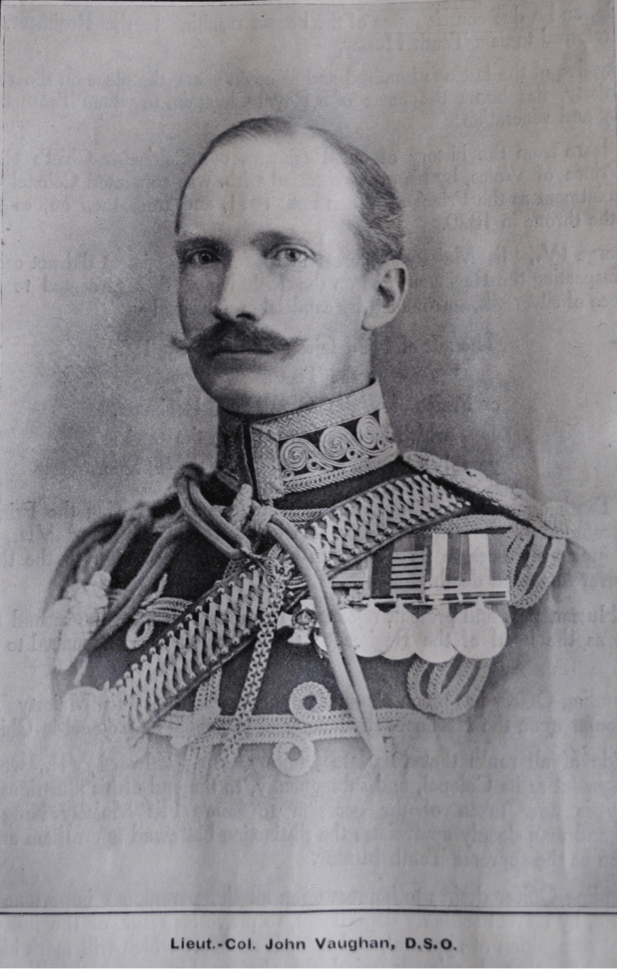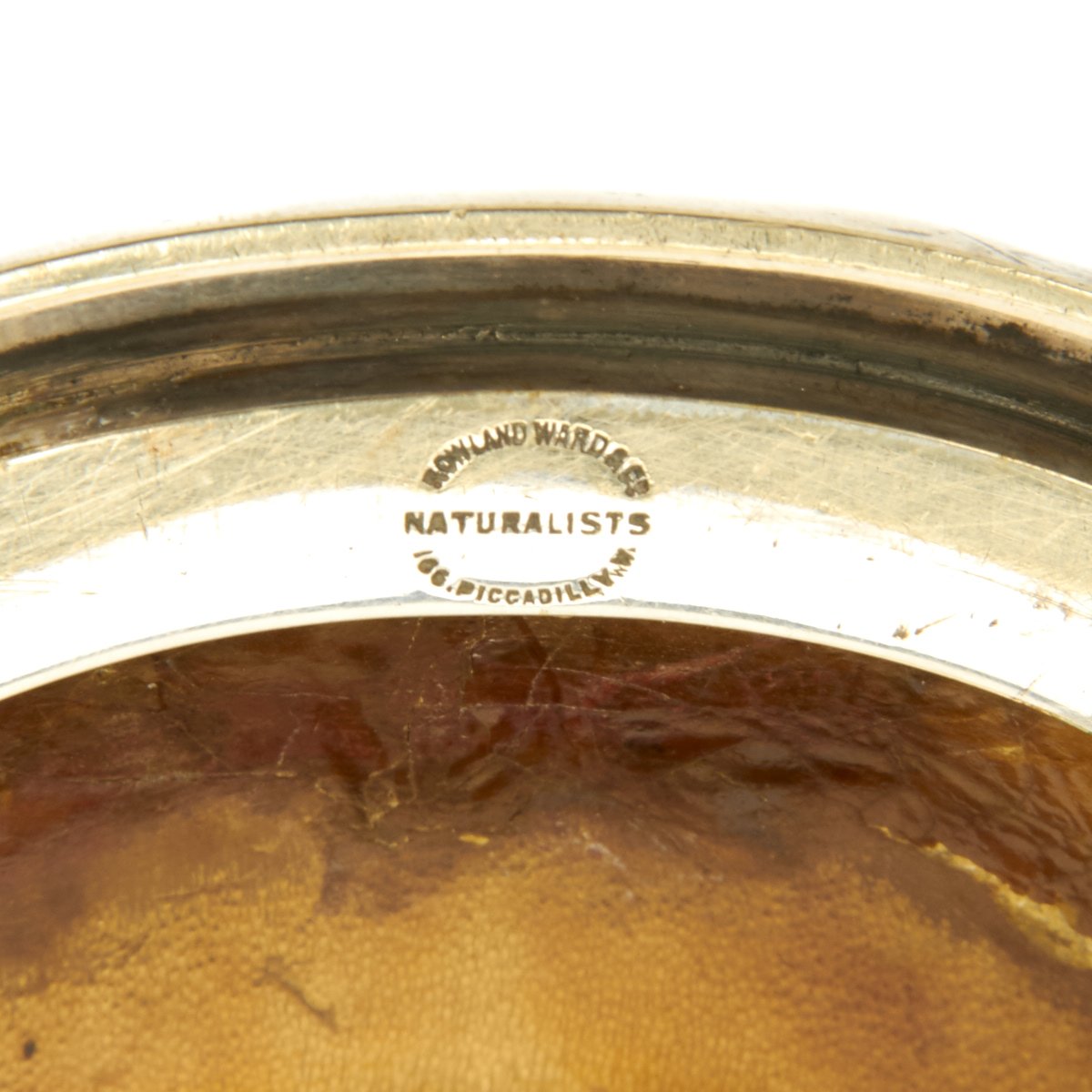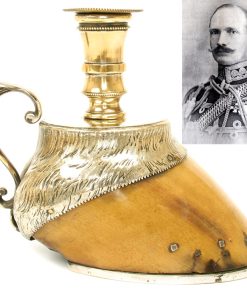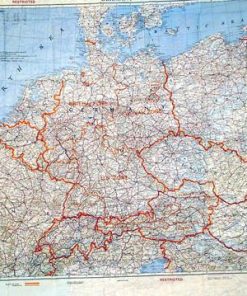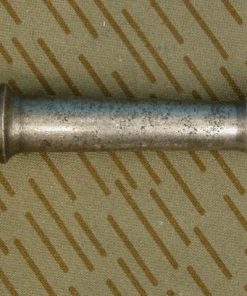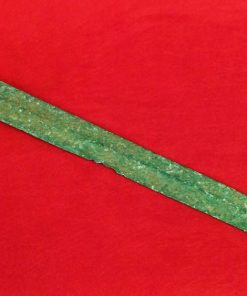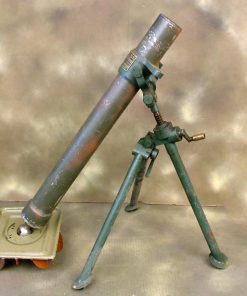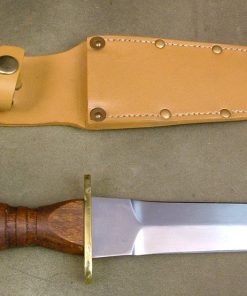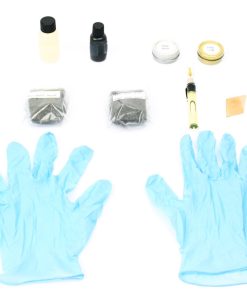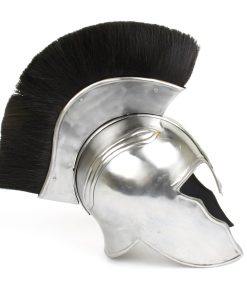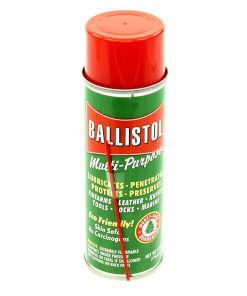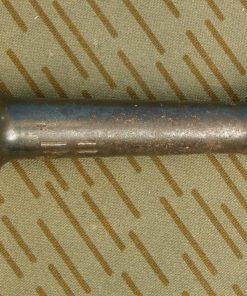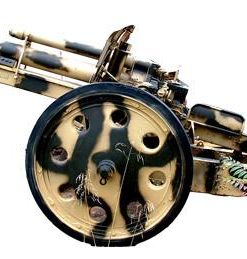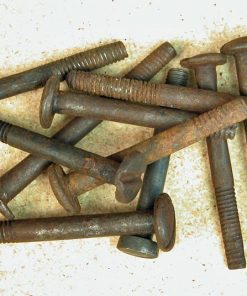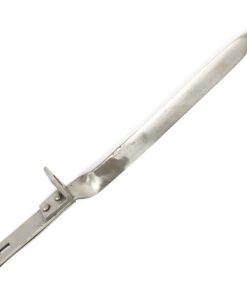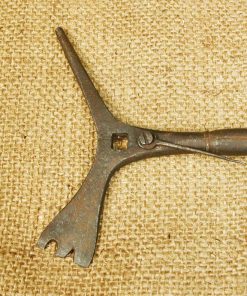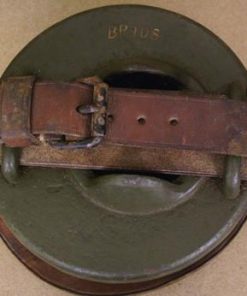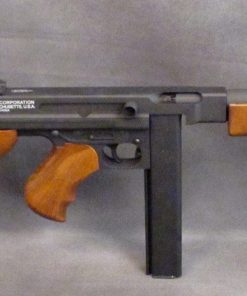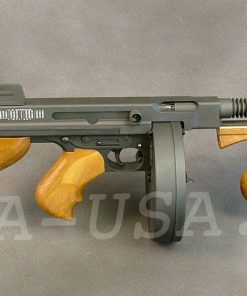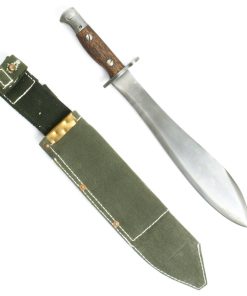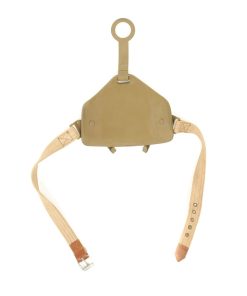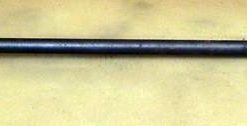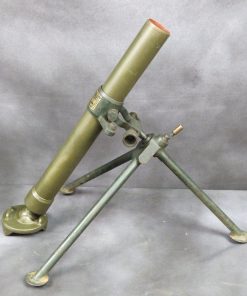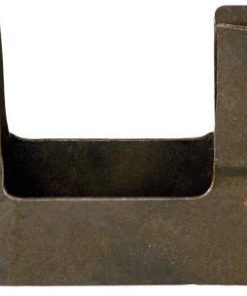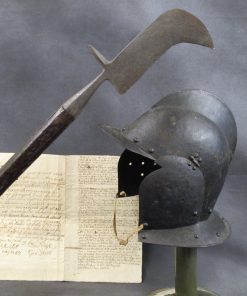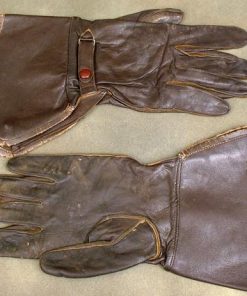Original British 1898 Battle of Omdurman 21st Lancers Named Horse Hoof Silver Candlestick Original Items
$ 1.495,00 $ 373,75
Original Item: One-of-a-kind. In 1898 the 21st Lancers served in Sudan during the Mahdist War, as the only British cavalry unit involved. It was there that the full regiment charged with lances in the classic cavalry style during the Battle of Omdurman in September 1898. Of less than 400 men involved in the charge 70 were killed and wounded and the regiment won three Victoria Crosses. These three were Private Thomas Byrne, Lieutenant Raymond de Montmorency and Captain Paul Kenna. This spectacular encounter earned considerable public attention and praise for the regiment, though it was also criticized as a costly and unnecessary anachronism – since the 2,000 Dervish spearmen dispersed by the 21st Lancers could have been destroyed by rifle fire with few if any British losses. Winston Churchill (then an officer of the 4th Hussars), rode with the unit.
“Omdurman” was the regiment’s only battle honor, giving rise to the satirical regimental motto of “thou shalt not kill. That same year, the regiment was given the title 21st (Empress of India’s) Lancers, taking the name from Queen Victoria who was the Empress of India.
This Horse’s hoof Inkwell mounted in what appears to be silver but is could also be silver plate is beautifully made and marked by ROWLAND WARD & CO, NATURALISTS, 166 PICCADILLY, W.
James Rowland Ward (18481912) was a British taxidermist and founder of the firm Rowland Ward Limited of Piccadilly, London. The company specialised in and was renowned for its taxidermy work on birds and big-game trophies, but it did other types of work as well. In creating many practical items from antlers, feathers, feet, skins, and tusks, the Rowland Ward company made fashionable items from animal parts, such as zebra-hoof inkwells, antler furniture, and elephant-feet umbrella stands.
Rowland Ward was also a well-known publisher of natural history books and big-game hunting narratives. The most famous and enduring Rowland Ward Ltd. product is the Records of Big Game series of books, which started in 1892 and is now in its twenty-ninth edition (2014). These books contain measurements of game animals from all over the world and is the oldest such series of books in existence.
On the surface of the folding lid is the engraved inscription (somewhat faded):
Dancer
CARRIED Lt J Vaughan
OMDURMAN 1898
A quote from then Lieutenant Vaughan who was attached Wheeling into line……..2nd September 1898
“…………I then heard the joggle of troops wheeling and looking back saw the Regiment wheeled into line and immediately conformed. I heard no order or trumpet to wheel into line or charge. We galloped over the snipers and then discovered a crowd of Dervishes in the wadi behind them….The Regiment presented a wonderful sight with lances down and with a better line than you could obtain in a practice charge nine times out of ten. I was lucky that my troop on the extreme left of the line hit the wadi on the straight where the water had not scooped out any steep banks….An instant before I glanced to my right and saw some brave little men on foot draw swords from their armpits and rush to certain deaths on the oncoming lances……I snatched out my .450 Webley and cleared a way for my Arab pony through the crowd….When I pulled up on the far bank of the wadi, there was my dear old Troop Serjeant at my elbow
..”
John Vaughan was born in July 1871 and was educated at Eton and Sandhurst. Commissioned into the 7th Hussars in March 1891, he served as a Troop Commander in the Matabeleland and Mashonaland operations of 1896-97 (Medal and clasp), and in the Nile Expedition of 1898, when he was present at the famous charge at Omdurman (Queens Medal and Khedives Medal, with clasp). Vaughans description of that memorable event appears in his Cavalry and Sporting Memories, which was published in 1955.
Advanced to Captain in October 1899, Vaughan served throughout the Boer War, onetime as A.D.C. to the G.O.C. Cavalry Division and as D.A.A.G., Intelligence, Cavalry Division. He witnessed extensive action, had command of a column in the relief of Kimberley operations, and was awarded the Queens Medal with 6 clasps and the Kings Medal with 2 clasps, in addition to a D.S.O. for a memorable encounter with the enemy at Boschmans Kop during the Guerilla War. The recommendation stated: On 1 April 1902, near Springs, South Africa, when acting as Intelligence Officer to a column, he led the Queens Bays to capture some Boers in a deserted farm. After capturing some prisoners, this regiment was attacked at dawn by superior numbers, and fought a rear-guard action until the 7th Hussars came up and counter-attacked the enemy. Major Vaughan commanded one wing of the Bays during the retirement, after having been wounded before daylight, and subsequently advanced with a squadron of the 7th Hussars to assist them by his knowledge of the country. He continued fighting until he fainted.
By the outbreak of hostilities in August 1914, Vaughan was serving as a Colonel Commandant of the Cavalry School at Netheravon, but quickly went to France as G.S.O. 1, 1st Cavalry Division, B.E.F. In the following year he was appointed G.O.C. 3rd Cavalry Division, in which role he served until early 1918 when he was appointed Inspector of Q.M.Gs Services, British Armies, France. Vaughan, who retired as a Major-General in 1920, was created C.B. and C.M.G., in addition to being awarded the French Legion of Honour (Commanders grade).
In the Second World War, he commanded the Home Guard of Merioneth and Montgomeryshire – Woe betide the Germans if they had thought of landing on our back door by the shores of Harlech. Indeed the General was a forthright character, imbued with a strong sense of duty, assets best described by his regimental obituarist:
He was hard as nails. Spartan in his disregard of luxury, danger or death. The flesh-pots could never tempt him any more than wild horses, black fences or German bullets could daunt him. He was a man absolutely without fear and he accepted that state of mind as a matter of course. He was completely honest in his outlook on life, punctilious in his code of ethics and scrupulous in his sense of honour. It would have been impossible, unthinkable for him to lie. From his boyhood, he had exercised a self-control which made him utterly indifferent to pleasure, hardship or danger.
The General died in his 85th year in January 1956, following a riding accident – It was the end he would have chosen. He was carried home, shaken, bleeding, and put to bed, conscious but in no pain. Within a week he died peacefully.
Wonderful quality, by a famous London Maker, having belonged to an important officer commemorating a truly historical event.
Fast Shipping with Professional Packaging
Thanks to our longstanding association with UPS FedEx DHL, and other major international carriers, we are able to provide a range of shipping options. Our warehouse staff is expertly trained and will wrap your products according to our exact and precise specifications. Prior to shipping, your goods will be thoroughly examined and securely secured. We ship to thousands clients each day across multiple countries. This shows how we're dedicated to be the largest retailer on the internet. Warehouses and distribution centres can be located throughout Europe as well as the USA.
Note: Orders with more than one item will be assigned a processing date depending on the item.
Before shipping before shipping, we'll conduct a thorough inspection of the items you have ordered. Today, the majority of orders will be delivered within 48 hours. The delivery time will be between 3-7 days.
Returns
The stock is dynamic and we cannot completely manage it because multiple stakeholders are involved, including our factory and warehouse. So the actual stock may alter at any time. It's possible that you may not receive your order once the order has been made.
Our policy is valid for a period of 30 days. If you don't receive the product within 30 days, we are not able to issue a refund or an exchange.
You can only return an item if it is unused and in the same state as the day you received it. You must have the item in its original packaging.
Related products
Uncategorized
Uncategorized
Uncategorized
Uncategorized
Uncategorized
Uncategorized
Uncategorized
Uncategorized
Uncategorized
Band of Brothers ORIGINAL GERMAN WWII Le. F.H. 18 10.5cm ARTILLERY PIECE Original Items
Uncategorized
Australian WWII Owen MK1 Machine Carbine SMG Custom Fabricated Replica with Sling Original Items
Uncategorized
Uncategorized
Uncategorized
Armoured Fighting Vehicles of the World: AFVs of World War One (Hardcover Book) New Made Items
Uncategorized
Uncategorized
Uncategorized
Uncategorized
Uncategorized
Armored Burgonet Helmet & Polearm from Scottish Castle Leith Hall Circa 1700 Original Items
